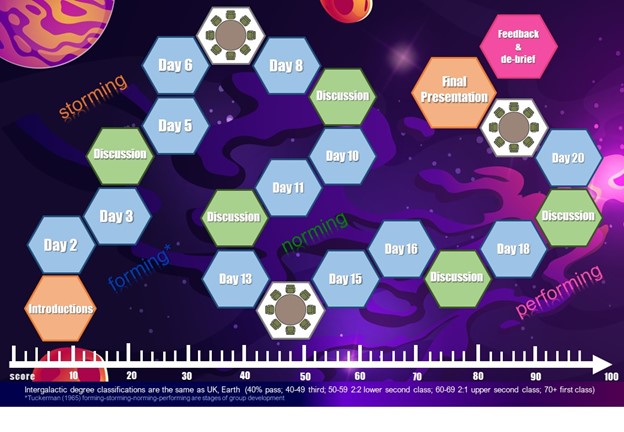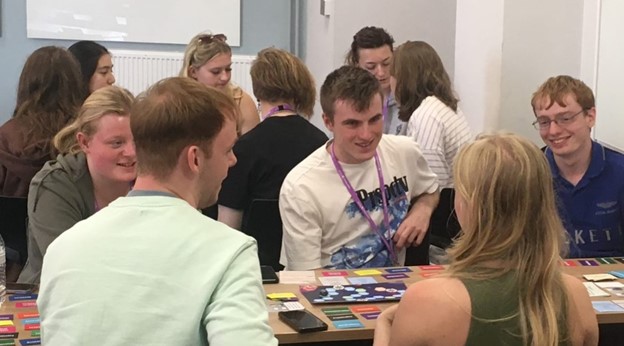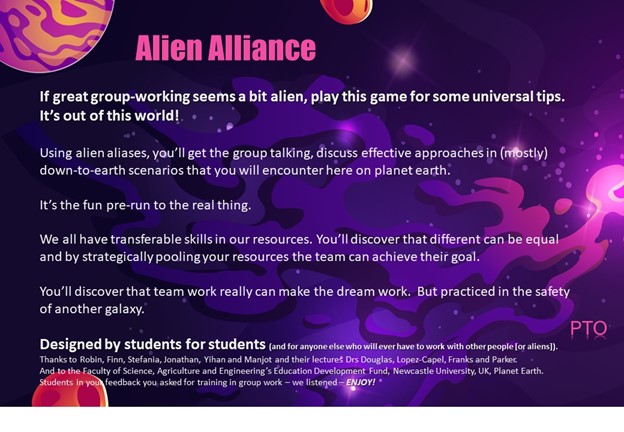Catherine Douglas, Senior Lecturer: (she/her) and Manjot Brar, Student intern: (she/her)
Natural and Environmental Sciences
Faculty of Science, Agriculture and Engineering
What did you do?
To address student feedback requesting support in preparing for groupwork, we collaborated with students to develop a fun, low-stakes, interactive boardgame… based around aliens. The boardgame was named ‘Alien Alliance’.
See the animated game instructions below:
Who is involved?
| Staff | Student intern |
| Catherine Douglas | Robin Goode |
| Elisa Lopez-Capel | Finn Mawer |
| Jeremy Franks | Stefania Bilca |
| Simon Parker | Jonathon Dodd |
| Yihan Shi | |
| Manjot Brar |
How did you do it?
A successful bid to Faculty Education Development funded student interns to devise the game. The brief was to facilitate ice-breaking, help students recognise the value of bringing different skills to the group (including a nod to Belbin team roles) and enable students to discuss effective strategies for addressing common group working issues both in University and in work. We also wove in a bit about the value of feedback.
We hoped to build in some equality, diversity and inclusion, but the students innovated the alien aliases as a more subtle way of presenting differences.
The game has quick-fire introduction cards to get the group talking, finding things in common and sharing experiences unrelated to the game or any project they may subsequently be involved in. The group’s spaceship counter then works its way around the board which is laid out to represent a 3 week assignment.

The Alien Alliance Groupwork Board
The landing spaces are ‘scenarios’ which are resolved through sharing transferable-skills cards (‘resources’ such as communication, leadership, creativity, technology) and ‘discussions’ where students try to reach a consensus on how they might deal with an issue (against the clock). There is some additional strategy which can affect total team points. The final twist is a roll of the dice where all the group’s hard work could be undone if the roll denotes that they did or did not access and implement their feedback.
Did it work?
Yes. The game was piloted with the PARTNERS summer school students (‘widening access’ mostly 18 year-olds) and received incredibly positive qualitative feedback (see a selection below). It has now been refined and trialed with Stage 1 inductions, a small Stage 3 module and a 200 student Stage 2 interdisciplinary module. Our School DELT who has observed these pilots has recommended it be rolled out to tutor groups for Stage 1. Our Stage 3 medical student intern is also hoping it will be adopted for some of their group working modules.

Students playing the Team Work Training Board Game
In the feedback to date (predominantly from the 18 year olds) there was unanimous agreement that the game broke the ice between players and promoted conversation, thus showing its efficacy as an induction tool. The cards alone have also been used successfully as an induction ice breaker.
Q: Did the game ‘break the ice’ – get everyone in the group talking?
- Yes. Yes. Yes. YES. YES.
- Yes it helped to get to know the group better and seemed to make it less awkward when you’re given topics to discuss
- Yes, I wasn’t initially confident in how well the group would communicate, but it ended up being a lot of fun
Feedback also indicated that students felt the game was fun and enjoyable whilst also educational in that it gave them a good insight into the potential challenges teamwork can pose as well as tips for good group work etiquette via the discussion of solutions.
Q: Did you enjoy it, explain why?
- I did enjoy it because it got everyone in the group discussing the different scenarios and allowed for some good laughs within the group while still having a serious idea behind it.
- yes, the concept was fun and the game layout was unique, the game sparked helpful discussion into potential team scenarios in a light and friendly environment.
- Yeah I did it was a more fun and relaxing way to get talking with people you don’t know
All scenarios and discussion points were regarded to be useful and insightful. It was particularly noted that shy students and those who had declared a non-visible disability or felt anxious in social situations, felt it very effective. One Stage 3 student who openly declared they did not like board games, conceded that she had enjoyed this and found it helpful (praise indeed).
Q: Did you feel the game will help with future group work and how?
- I believe it brings light to uneasy situations and can help us learn to work them out
- Yes I think so as it gave an insight into potential issues and means of resolving problems
- It breaks the ice and it goes through scenarios that are actually likely to occur. It isn’t stilted, they’re really relevant
- yes, it helped provide an opportunity to practice communication and team skills with new people in new environments, without the pressure of failure.
This year we will be gathering student feedback and evaluating where using the game is most effective (small modules, large modules, stage 1, 2 or 3). We will also be comparing module evaluations from this year to last to assess impact. The game should withstand repeat plays as scores can be beaten, students can get to know different people, they will experience different scenarios and there is some strategy that can come into play to improve their score.
The instructional video was made to enable any member of staff to grab a game set, get the students to scan the QR code and get going with the game, so no member of staff needs to be familiar with the game to use it for icebreaking and to introduce group work (students should be self-sufficient with the quick video and the full instruction booklet).

Promoting the Alien Alliance Groupwork boardgame
The game is intended for groups of 4-8. We have 25 sets and are happy to loan out to anyone interested in reviewing the game and trialing with their students. We also have blank discussion cards which could be customed to consider specific group work issues in different contexts.
Did it meet elements of the Graduate Framework?
Yes it met many! Our student intern identified the following, and other students’ comments are below.
Collaborative: Obviously working in a team requires communication, clear expression of ideas, listening to others and considering a diverse range of opinions! To move forward in this board game, flexibility from players is required as there are changing demands via different scenario cards, which may require a student to compromise their own ideas and work towards a mutual agreement in the face of conflict.
Engaged: The board game requires students to commit to their team and focus on reaching a shared goal, which naturally involves being engaged. This is also a novel way of learning skills, which requires engagement from those participating.
Future focused: A central aim of this board game was to prepare students for future obstacles that teamwork may bring both within university and in the work place post-university.
Globally and culturally aware: By including elements of EDI within the game e.g. giving each alien a unique culture and having discussion and scenario cards based around these encouraged appreciation and respect for diverse backgrounds.
Reflective and self-aware: Working with Belbin roles encourages students to evaluate what sort of team player they are as well as recognize their own strengths and weaknesses.
Critical thinker: To move forward on the board, the game requires students to think critically about the resources they have as well as weighing up different perspectives during discussions to reach the most strategic decision.
Confident: This game prepares students for challenges within teamwork and thus fosters confidence in the players to tackle similar issues in the future. Students even identified that it enhanced their general confidence in talking to people:
Q: What did you get out of the session? (How did it benefit you? – it might be in ways we didn’t expect)
- How to contribute to team discussions,
- Improved my confidence in speaking in groups
- Since everyone took turns it helped provide that time to have input in group situation, which may not be there otherwise
- It made me realise that speaking in a big group isn’t the end of the world
- Taught me new skills needed for teamwork
- Allowed my confidence to increase in group work
- Helped me get to know more people
- Got me to ask more about other people’s lives
- I have learned to be able to combine different individual traits and skills to reach a goal
- Made me think of scenarios I wouldn’t usually think into
- Practised communicating with a new group of people
- Understanding different points of view
Find out more about the Graduate Framework
Want to know more?
If you would be interested in finding out more about the Alien Alliance Groupwork board game, please contact Catherine Douglas (catherine.douglas@newcastle.ac.uk)
As a follow up to this case study, Manjot Brar, a student intern on the project has published a paper on using a gamification framework in the Student Engagement in Higher Education Journal
